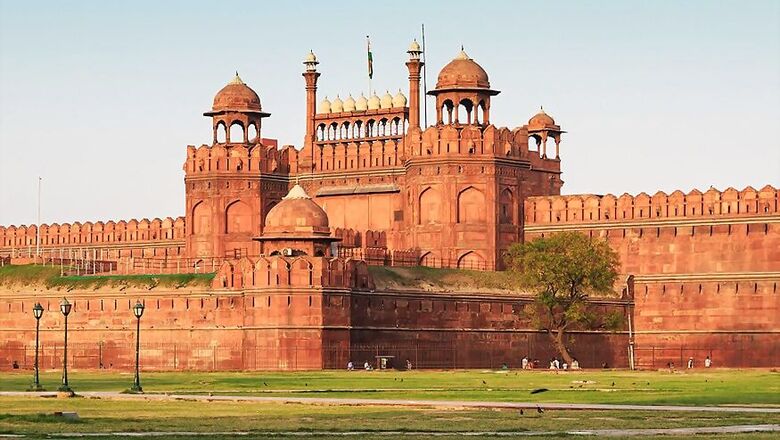
views
New Delhi: The Dalmia Bharat group became the first corporate house in India to adopt a historical monument, as it took over the Red Fort to maintain and preserve the heritage structure for a period of five years.
The move comes under PM Narendra Modi’s ‘Adopt a Heritage’ scheme, which will not just be limited to the Red Fort. As per official records, corporate giants GMR and ITC Limited have given a letter of intent to adopt the Taj Mahal in Agra.
This isn't the first time that private players have participated in cultural endeavours. In November 1996, the HD Deve Gowda-led government came out with a gazette notification for the National Culture Fund.
The UPA government, too, made efforts to renew the thrust of the NCF and ‘force’ private players in heritage activities through their Corporate Social Responsibility.
Is ‘Adopt a Heritage’ a new step in preserving and conserving heritage of India by attracting private players?
No. The ‘Adopt a Heritage’ scheme is basically a repackaged version of National Culture Fund. This is managed and administered by a council chaired by the Minister for Culture and an Executive Committee chaired by the Secretary, Ministry of Culture. Members of the NCF Council are from corporate houses, private foundations and experts in various art forms, academicians. Under the NCF it is possible for a donor to identify a project along with any specific location/aspect for funding and an agency for the execution of the project.
What are the objectives of NCF and ‘Adopt a Heritage’?
The purpose of NCF was to augment governments’ efforts and facilitate public-private partnership in the field of heritage conservation and promotion. The new Trust enabled institutions and individuals to participate in their rightful role in promoting and preserving India’s rich cultural heritage.
The NCF enabled the government to mobilise extra-budgetary resources by allowing direct contributions to the NCF account maintained outside the Consolidated Fund of India. All contributions to NCF are given 100% tax exemption under Section 80 G (2) of the Income Tax Act of 1961.
Under PM Modi’s new project, government entrusts heritage sites/monuments and other tourist sites to private sector companies, public sector companies and individuals. This makes the private players ‘Monument Mitras’, who would associate pride with their CSR activities. They would provide basic and advanced amenities in the tourist destinations and would also be expected to look after the operations, maintenance of the amenities. The project is intended to begin with 93 ASI ticketed monuments and gradually expand to other natural and cultural sites across India.
What were the projects under NCF and who are the preliminary players under the new scheme?
The NCF has actively been associated with many leading corporate houses, public sector units, international trusts and funding agencies.
Among them are, Aga Khan Foundation and Oberoi Group of Hotels, who completed the project on revitalising the garden and lighting of the main tomb at Humayun’s Tomb Complex at a cost of Rs 2.25 crores. The illumination, signage, conservation works of Jantar Mantar, New Delhi involved Apeejay Surendra Park Hotels Ltd. The Indian Hotels Company Ltd (Tata Group) sponsored the conservation project at Taj Mahal at a cost of Rs 1.87 crores.
Furthermore, the Archaeological Survey of India, National Culture Fund, Indian Oil Corporation and Indian Oil Foundation signed a MoU for five important monuments of India namely Sun Temple, Kanheri Caves, Khajuraho, Monuments in Hampi and Warangal Fort. Indian Oil Corporation contributed Rs 25 Crores for this project.
The Steel Authority of India was involved in a project for the conservation of Monuments at Lodi Garden, New Delhi and funded Rs 1 Crore for the purpose. Foreign institutions are also engaged with similar projects. The World Monument Fund is involved in a collaborative project with ASI and NCF, contributing $43,900 for Jaisalmer Fort.
The ‘Adopt a Monument’ scheme also lists many monuments, including the Taj Mahal. Parties who have been given a letter of intent include Orange County Resorts and Hotels, Heritage Resorts, Kakatiya Heritage Trust, The Padmini Haveli, Resbird Technologies and Climbing World. The monuments/tourist sites for which the letter of intent has been given include Lotus Mahal, Elephant Stables, Chittorgarh Fort, Gol Gumbad, Kumbalgarh Fort Wall among others.
Why is the involvement of private players being questioned?
The Communist Party of India (Marxist) expressed its opposition to the agreement (MOU) as it “virtually hands over the iconic Red Fort in Delhi to the Dalmia group for a period of five years in exchange for a payment of 25 crores.”
“The initiative will allow the company to proclaim in a prominently displayed sign that the Red Fort has been ‘adopted by Dalmia Bharat Limited’. Handing over this iconic monument to a corporate entity is nothing short of blasphemous,” said the CPI(M) statement.
The Left party reminded the Government that a Parliamentary Committee looked into the issue of handing over heritage sites to private corporates and had decided against this unanimously.
What did the opposition do with regard to NCF?
In 2013, under the UPA government, the National Culture Fund (NCF) under the Ministry of Culture organised a meeting to generate awareness about the role of NCF in safeguarding heritage and the responsibility of the Public-Private sector in facilitating the same.
The meeting acknowledged NCF's primary mandate, which is to establish and nurture Public Private Partnerships (PPP) in the field of heritage.
Chandresh Kumari Katoch, Minister of Culture (Chairperson of the Council of NCF) and Sachin Pilot, Minister of Corporate Affairs addressed the gathering of Corporate Heads on the importance of Corporate Social Responsibility (CSR) for Indian Heritage.
“India has a deep commitment towards preserving its cultural heritage; it is our culture that gives us our identity and is also a source of income generation and economic growth that promotes tourism and cultural diplomacy. It is our constitutional and sovereign duty as citizens of this country to take part in the nation-building process by first preserving and protecting our heritage and composite culture that belongs to all communities, both urban and rural, in every part of the country,” said the statement from the Press Information Bureau.
Interestingly, Trinamool Congress MP Derek O'Brien, who was leading the Standing Committee on Transport, Tourism and Culture had vetted the ‘Adopt a Heritage’ proposal and noted that it is a ‘welcome step’. The committee made recommendations that major corporate houses should be forced to adopt our heritage sites under Corporate Social Responsibility (CSR).















Comments
0 comment